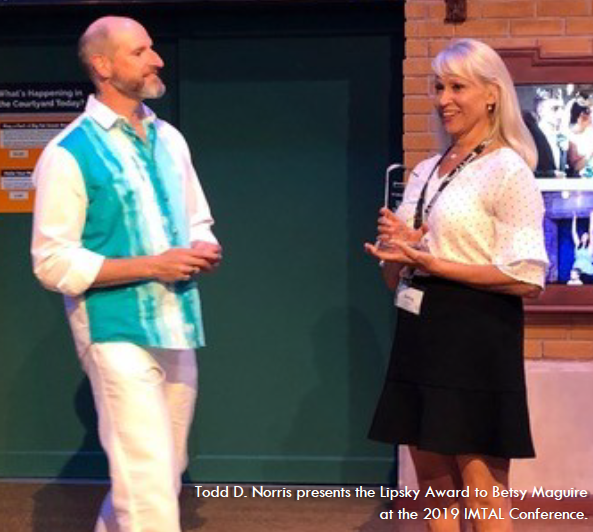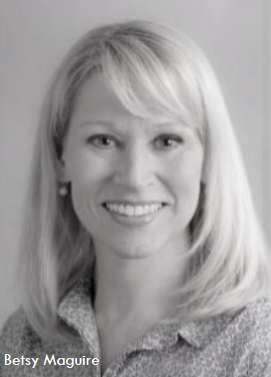The winner of 2019’s Lipsky Award for Excellence in Playwriting was Betsy Maguire for her play “Tales from the Dungeon: Life at Newgate.” This script, created for presentation at The Old New-Gate Prison & Copper Mine in East Granby, Connecticut, is playful and humorous but does not shy away from the darker history of Newgate. It employs four historic characters, including a notorious counterfeiter, a murderess, a preacher and an abusive prison keeper. Two fictional characters, a prison guard and his wife, round out the cast and provide levity and interaction with the audience. The play is based on over twenty sources and was presented in the open, one-acre prison yard, using the brick ruins as the perfect backdrop for live theatre. Member-at-Large and former IMTAL President Douglas Coler sat down last fall to chat with Betsy to learn more.
 Doug: We first met during the IMTAL conference in Connecticut in 2017, at Mark Twain House. You and the team were presenting character tours there.
Doug: We first met during the IMTAL conference in Connecticut in 2017, at Mark Twain House. You and the team were presenting character tours there.
Betsy: I started as a historic interpreter and I was there for about five years total. Around three years in, the Executive Director was very interested in creating theater in the space. She thought it would be fun to do a nighttime event over a couple of weekends with the servant staff in the house in character. Anybody on staff who had theater on their resumé was invited to create their own little piece to do at this event. I created Lizzie the gossipy maid, which was based on a young girl in the House back in Twain's time. The Executive Director loved it and asked if I would create a program that could be done on a daily basis in the house. I was hired to create their living history programs, which I loved doing. After two years I left the program in good hands and went on to do freelance work.
Having taken the character tour, I honestly can't imagine touring the house in any other way.
Spending an hour with an actor in character really isn't for everyone, but, to me, it makes it very personal. Some of the scripts I wrote were very emotional and some were funny, and I thought we had a great response to it. With six characters going at once I made sure there was no overlap in information. I thought that was important. What we were trying to do was get people, especially local people, to come back to the house and not just say, "Oh I've seen that house. I don't have to go back.” We wanted people to visit and then revisit. I was very careful not to make anything redundant within the scripts I wrote. It's not that I didn't mention the same people, but the various characters spoke very differently about certain events and rooms and things like that.
So how did the Newgate script come about?
It wasn't too long after I decided to go off on my own [that] I got my first gig. Morgan Bengel of the Old New-Gate Prison & Copper Mine approached our local theatre company and said, “We're reopening after nine years of being dark, and I would like to have visitors come and stay at the prison ground longer than 15 minutes to just read the placards, go down into the mines, and be on their way. Maybe if there was theatre going on, they would stick around and learn some more, and the local theatre company could perform.”
So the prison itself had been closed for more than nine years ?
Connecticut has four state museums and it's one of the four. They had all been closed for a while -- I believe Newgate definitely had been for nine years. So the question became, How long am I going to give myself? Because I knew nothing about it, I had never been there, I didn't know anything of the history, but there was so much information to absorb! Morgan was very helpful giving me things. Whole books were written about some of the prisoners. Connecticut has a very old and rich history and people love to write about it. I had plenty to read, and thank goodness for the Internet. I always say I don't know how people wrote pre-internet. I really don't. I had to put a pin in it and say, Well after a month or a month and a half I'm just going to stop reading and start writing.
The obvious thing I could have written about but didn't is that Newgate was thought to be escape-proof, but people escaped left and right. My original thought was something kind of lighthearted and funny about how people got out of those mines. Then I realized there was this very interesting time period, a couple of years before it closed, where these characters that I was reading a lot about were all there at the same time, including one of their only female prisoners. I thought Okay, I'm just going to set it right in that month and then I can write about all these people and the murderess. All I had was a newspaper article about her trial and that was it pretty much. That's fun to me: to take very little information but use it as much as you can. I met with Morgan Bengel in February and delivered her the script in May, and we began rehearsals in June. The first performance was July of 2018. They did it again this year [2019] without me, which I thought was great.
You said that some of the descendants of the characters in this script have seen the show?
One of the characters was a notorious counterfeiter. He was a braggart and wrote in his own autobiography that he faked an injury to get released from prison. He was just a funny guy. One of his descendants came and then came again and brought family members -- and I think came again this past summer. I was nervous because he introduced himself to me before the show. I really poked fun at this guy -- I mean, it was just that kind of character, it was easy to have some fun with it. I thought, Oh my gosh I hope he doesn't revere this guy or think that I'm being terrible. But he loved it. He laughed, he thought it was funny, he seemed to really like it and not be offended at all.
And you're working on a radio drama now?
There's a company here called Herstory Theater and they produce various historical shows. Actress/Playwright Virginia Wolf, who runs it, does a one woman show called Panic in Connecticut about the witch trials. Every year she presents It's a Wonderful Life as a live radio drama as if it were being done in the 1940s. I've been part of that as an actor. Next year she would like to do four spooky one-acts set in a radio studio in the 1940s. She asked for playwrights who live in Connecticut to each contribute a piece to it.
I like getting different things. One of the historical societies in town is doing an exhibit called The Road to Equality next year, so I'll be working on that [as well]. I'm concentrating on the women's suffrage movement and [they] asked me to tie a play to their exhibit which I've actually never done before. I'm at the point where I am able to and feel very lucky that I can turn down work. I've done so three times in the last two years for various reasons, but a lot of history is men and boys fighting and I'm just, like, ...I don't care about that. So when The Road to Equality came along, I said now you're talking! I also feel very strongly that certain stories require and deserve a writer who is personally tied to the history. Native history, for example… I feel that they should have a Native writer. I mean, who am I to try and dramatize the struggles of Native life?
Did you always know this is what you wanted to do, or did you come to writing later?
Oh, I was a computer science major. I worked for IBM. That was my career. So no, no.
So how did this first happen?
When we moved to Simsbury in 1992 I had twins and then another daughter and my husband was traveling quite a bit internationally. I started to get into community theater and was really enjoying it. Our kids were too little to be left all the time and I wanted to keep my hand in the theater. We're a pretty small community in Connecticut. There's a very active, lovely community of actors here, and I wanted to stay involved. I decided, well, I could write for theater and that'd be fun, right?. I had never written before but I was a voracious reader... I think I've read every single play that's on the shelves in our library. So that's how I learned. I saw a notice that the Association for Theater and Higher Education was sponsoring this national playwriting contest for 30- to 40-minute plays. I wrote a play in 2002 called Heart Suspended and it came in second. I thought, Oh this is fun. Maybe I'll just do this now. I started writing one act plays and they were getting into festivals and being performed and I was going to see them, and it was really fun.
Your first IMTAL conference as an attendee was at Indianapolis Children's Museum, who do amazing work.
And the theater, I thought, was off the charts. I thought it was absolutely wonderful. The whole place is great. It was an unexpected place to see such poignant theatre being done. Honestly I thought it was going to be all bubbles and magnets. You know it's the children's museum. Yes, it was terrific.
But I'm so thrilled that you are now part of this organization and I'm thrilled that you can help us spread the word. I'm just delighted that you found us and we found you. Thank you, and congratulations again on the Lipsky award!
 Meet The Lipsky Winner:
Meet The Lipsky Winner:
 Betsy Maguire is a freelance writer specializing in grant-funded plays and unconventional theatre spaces. She created the Living History pro-gram at The Mark Twain House & Museum in Hartford, Connecticut, writing scripts and training actors to portray members of Mark Twain’s family and servant staff. Other nonprofit and history organizations Betsy has worked with include the Simsbury Historical Society, Old New-Gate Prison & Copper Mine, the New England Air Museum and the Theatre Guild of Simsbury. She is a member of the Dramatists Guild and the International Museum Theatre Alliance.
Betsy Maguire is a freelance writer specializing in grant-funded plays and unconventional theatre spaces. She created the Living History pro-gram at The Mark Twain House & Museum in Hartford, Connecticut, writing scripts and training actors to portray members of Mark Twain’s family and servant staff. Other nonprofit and history organizations Betsy has worked with include the Simsbury Historical Society, Old New-Gate Prison & Copper Mine, the New England Air Museum and the Theatre Guild of Simsbury. She is a member of the Dramatists Guild and the International Museum Theatre Alliance.